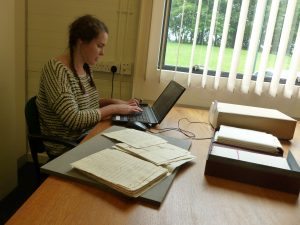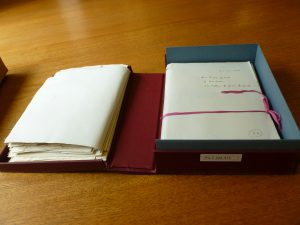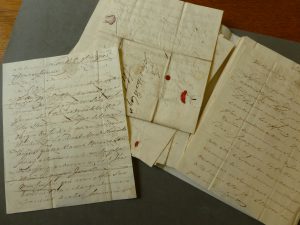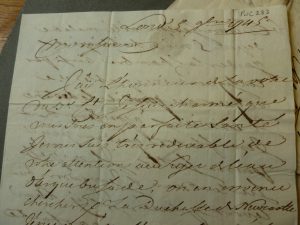September 6, 2016, by Kathryn Summerwill
Discovering John Achard
This is a guest post by UoN student Megan Shore about her CLAS student placement at Manuscripts and Special Collections in March-July 2016.
I did a work placement in Manuscripts and Special Collections in the last semester of my final year. I heard about the placement from the employability team in the School of Cultures Languages and Area Studies (CLAS) and it was a perfect fit for me as a student of French and History. I applied because I am interested in working in archives, wanted to gain skills for my CV and wanted to put my French language skills to use.
My role in the work placement was reading, translating and summarising a collection of letters written in French that are held by the University at King’s Meadow Campus. My summaries of the letters will be put online for future researchers to use so they can identify if the letters contain valuable information for their studies.
 The letters (from Pw C) were written to John Achard, a Swiss man who was the French tutor at the residence of the Duke of Portland in the middle of the eighteenth century. It was fascinating to read the original correspondence from so many different people – friends, business acquaintances, family members – in the very specific letter-writing style of the period. There were letters asking for letters of recommendation and employment for sons and nephews, for monetary loans, for the purchase of scientific equipment, invitations to join academic book-clubs, accounts of personal lives and even reports on the War of Austrian Succession coming straight from the battlefield.
The letters (from Pw C) were written to John Achard, a Swiss man who was the French tutor at the residence of the Duke of Portland in the middle of the eighteenth century. It was fascinating to read the original correspondence from so many different people – friends, business acquaintances, family members – in the very specific letter-writing style of the period. There were letters asking for letters of recommendation and employment for sons and nephews, for monetary loans, for the purchase of scientific equipment, invitations to join academic book-clubs, accounts of personal lives and even reports on the War of Austrian Succession coming straight from the battlefield.
 I learnt a lot about eighteenth-century society and culture as well as the geography of various towns in Europe. It was interesting the see first-hand the development of the French language, as I had to decode old-fashioned spellings (ys instead of is, an excess of ss, no accents). This work required a lot of attention to detail and fact-checking and also consistency in the use of the house style in putting the data into the spreadsheet. I believe it really helped me when it came to my final French translation exams as I had become used to reading French, finding the English alternative and writing a summary of the key information.
I learnt a lot about eighteenth-century society and culture as well as the geography of various towns in Europe. It was interesting the see first-hand the development of the French language, as I had to decode old-fashioned spellings (ys instead of is, an excess of ss, no accents). This work required a lot of attention to detail and fact-checking and also consistency in the use of the house style in putting the data into the spreadsheet. I believe it really helped me when it came to my final French translation exams as I had become used to reading French, finding the English alternative and writing a summary of the key information.
I also really enjoyed the opportunity to do something different from the day-to-day life of a student and feeling that my language skills were being put to use. I enjoyed getting out to King’s Meadow Campus and being shown around the archives and learning about conservation of materials. All the staff at the Manuscripts and Special Collections were very friendly and helpful and it was a lovely, calm environment to work in.
I would recommend a work placement at the Manuscripts and Special Collections to anyone who is interested in history and languages, wants to gain skills such as independent working, attention to detail or wants to put their skills to use for the good of the archives!
For further information about the CLAS Work Placements scheme (and to see if it can become 10 credits of your degree or 20 credits of the Nottingham Advantage Award!) please see: https://www.nottingham.ac.uk/clas/prospective/undergraduate/careers-and-employability.aspx and contact Elizabeth Yearsley at mzzey@exmail.nottingham.ac.uk
If you’d like to view these collections, or any of our archives and rare books, please contact us to make an appointment. For more information about our holdings, please visit our website. You can also follow us on Twitter @mssUniNott or read our newsletter, Discover.
No comments yet, fill out a comment to be the first

Leave a Reply